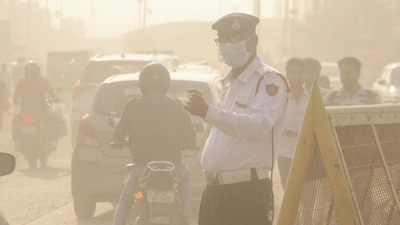ARTICLE AD BOX

NEW DELHI: The Commission for Air Quality Management (CAQM) on Saturday invoked Stage II of the Graded Response Action Plan (GRAP) across Delhi-NCR after air quality showed a sharp deterioration, crossing into the ‘very poor’ category.
The decision follows an emergency review by the Sub-Committee on GRAP, which observed a steady rise in pollution levels through the day.According to the order, “The AQI of Delhi has shown an increasing trend since morning and has been recorded as 296 at 4.00pm and 302 at 7.00pm. The forecast by IMD/IITM also predicts further deterioration of AQI in the coming days.” The Sub-Committee, therefore, decided to implement all measures under Stage II of GRAP with immediate effect, in addition to those already active under Stage I.
Data from the Central Pollution Control Board (CPCB) showed Delhi’s overall Air Quality Index at 296 on Sunday afternoon—just below the ‘very poor’ threshold of 301. Of the 38 monitoring stations across the capital, 12 reported ‘very poor’ air quality, with Anand Vihar topping the chart at a severe 430. Other hotspots included Wazirpur (364), Vivek Vihar (351), Dwarka (335), and RK Puram (323).The India Meteorological Department (IMD) reported maximum and minimum temperatures of 33.3°C and 20.6°C respectively, with humidity touching 91% by evening.
Misty conditions are expected on Monday morning, though temperatures are likely to remain steady.Residents have begun expressing frustration over the annual spike in pollution. “Just like every year, pollution in Delhi persists… It causes difficulty in breathing, especially for cyclists like me,” said Aryan Gupta, a resident of Rohini. He attributed the worsening smog to vehicle emissions, stubble burning, and seasonal fireworks, saying that “closing schools and colleges are temporary solutions.”Stage II, applicable when AQI ranges between 301 and 400, includes intensified dust control, public transport expansion, and restrictions on diesel generator sets. Authorities have ordered daily mechanical sweeping and water sprinkling on roads, especially in high-traffic areas.Power supply agencies have been directed to ensure uninterrupted electricity to curb DG set usage. Public transport services—including buses and metro trains—will be augmented, and parking fees increased to discourage private vehicle use.The CAQM also urged Resident Welfare Associations to provide electric heaters to outdoor staff to prevent open burning of waste or biomass. Additionally, only CNG, electric, or BS-VI diesel inter-state buses will be allowed into Delhi.

 2 hours ago
4
2 hours ago
4









 English (US) ·
English (US) ·